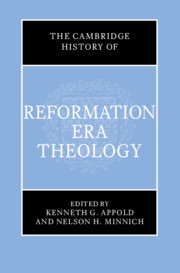Book contents
- The Cambridge History of Reformation-Era Theology
- The Cambridge History of Reformation-Era Theology
- Copyright page
- Contents
- Figures
- Acknowledgments
- Contributors
- Abbreviations
- Introduction
- Part One Theology in an Age of Cultural Transformation
- Part Two Schools and Emerging Cultures of Theology: Diversity and Conformity within Confessions
- Part Three Topics and Disciplines of Theology
- 21 Method and Ethos of Theological Instruction and Discourse
- 22 Biblical Theology
- 23 Systematic Theology
- 24 Controversial Theology
- 25 Sacramental and Liturgical Theology
- 26 Pastoral Theology and Preaching
- 27 Reformation Ethics and Moral Theology
- 28 Ecclesiastical Law in Early Modern Europe
- 29 Spirituality in the Reformation Era (1500–1675)
- 30 Catholic Christianity and Indigenous Religions in the Americas
- 31 Jesuit Catechisms in Japan and India
- 32 Theology in China ca. 1582–ca. 1688
- 33 Theology and Science
- 34 Theology and History
- 35 Theology, Politics, and Warfare
- 36 The Role of Art in the Theological Discourse of the Reformation
- Index
- References
35 - Theology, Politics, and Warfare
from Part Three - Topics and Disciplines of Theology
Published online by Cambridge University Press: 27 September 2023
- The Cambridge History of Reformation-Era Theology
- The Cambridge History of Reformation-Era Theology
- Copyright page
- Contents
- Figures
- Acknowledgments
- Contributors
- Abbreviations
- Introduction
- Part One Theology in an Age of Cultural Transformation
- Part Two Schools and Emerging Cultures of Theology: Diversity and Conformity within Confessions
- Part Three Topics and Disciplines of Theology
- 21 Method and Ethos of Theological Instruction and Discourse
- 22 Biblical Theology
- 23 Systematic Theology
- 24 Controversial Theology
- 25 Sacramental and Liturgical Theology
- 26 Pastoral Theology and Preaching
- 27 Reformation Ethics and Moral Theology
- 28 Ecclesiastical Law in Early Modern Europe
- 29 Spirituality in the Reformation Era (1500–1675)
- 30 Catholic Christianity and Indigenous Religions in the Americas
- 31 Jesuit Catechisms in Japan and India
- 32 Theology in China ca. 1582–ca. 1688
- 33 Theology and Science
- 34 Theology and History
- 35 Theology, Politics, and Warfare
- 36 The Role of Art in the Theological Discourse of the Reformation
- Index
- References
Summary
The Catholic Church of the early modern period struggled to accommodate to the changing world of the sixteenth century. Three developments in particular challenged Catholic theologians, philosophers, and political writers: the European discovery of lands across the sea, especially in the Americas; the rise of the state; and the Reformation. Their responses were various. Three leading Scholastic philosopher-theologians stand out: the Spanish Dominican Francisco de Vitoria (ca. 1483–1546), whose most significant contributions came while he was teaching at the University of Salamanca;
- Type
- Chapter
- Information
- The Cambridge History of Reformation Era Theology , pp. 718 - 736Publisher: Cambridge University PressPrint publication year: 2023

